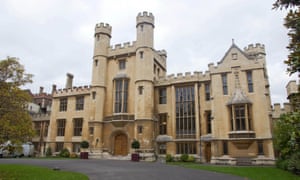
Pic:A focus on ethical investing has long been part of the Church of England’s mandate.
Staff reporter(wp):
The case for profitable ethical investing has been bolstered by the Church Commissioners for England, as the fund announced divine returns on its financial portfolio for 2016.
The body, which manages investable assets worth £7.9bn in order to “support the Church of England as a Christian presence in every community”, said it had smashed targets by making a 17.1% return on investments during 2016 – figures which will be the envy of many high-profile figures in the fund-management industry.
In 2016, Woodford Equity Income – which is run by the UK’s best-known manager, Neil Woodford – returned 3.2% compared with an 8.8% gain for the Investment Association’s UK equity income sector average, according to the financial website MoneyObserver.com.
The church’s fund’s outperformance over the past decade has slightly outpaced even the Yale Endowment fund, which is rated by the Financial Times (paywall)as the most admired in the sector.
The Church Commissioners, whose target is making a return of inflation plus five percentage points, said it had been partly aided in 2016 by sterling’s weakness after the Brexit vote, with the fall in the value of the pound accounting for about half the gains made on its equity portfolio.
First church estates commissioner Sir Andreas Whittam Smith said: “Contributing to this stellar out-turn was a strong showing by global equities (+32.9%), partly reflecting the depreciation of sterling. Equally helpful were our interests in private credit strategies (+33.1%), private equity (+26.1%) and timberland (+24.3%). The combined property portfolios delivered a creditable 11.6% in a relatively weak market environment.
“Consistency has truly been a guiding principle for the fund. Our historic performance over a 30-year period shows annual growth of 9.6% per annum, despite periods of turbulence in the financial markets and our own portfolio – an average of 6% per annum ahead of inflation.”
The Church Commissioners said returns meant it had contributed £230.7m to the mission of the Church of England, although it admitted this was “only around 15% of the church’s overall income – most funding comes from the extraordinary generosity of parishioners”.
The body said it had also been promoting responsible investment, including being “instrumental in filing climate disclosure resolutions at [mining groups] Anglo American, Glencore and Rio Tinto” and continuing “to vote against the majority of remuneration reports”.
Richard Saunders, its head of equities, added: “We have always argued that ethical investing does not put us at a disadvantage – so I’m not going to argue it puts us at an advantage [on the back of these returns]. We have a strong ethical approach and invest over the long term, which we think will be successful. We look to harvest returns over a long period.”
A focus on ethical investing has long been part of the body’s mandate, although some of its investment picks have still provoked debate.
In 2012, it sold its shares in Rupert Murdoch’s media group after the phone-hacking scandal. However, the following year the church’s pension fund was found to have taken an indirect stake in controversial payday lender Wonga, while it has also invested in areas of finance that many view as contentious such as hedge funds.
No comments:
Post a Comment